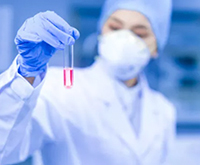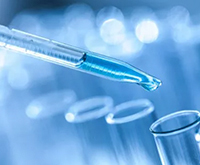Parathyroid Hormone (PTH)
Parathyroid hormone, also called parathormone or parathyrin, regulates the serum calcium concentration through its effects on bone, kidney, and intestine.
Parathyroid hormone (PTH) is an essential single-chain polypeptide hormone secreted by the primary cells of the parathyroid gland.
Its principal function is to regulate the metabolism of calcium and phosphorus invertebrates and promote the increase of blood calcium level and the decrease of blood phosphorus level.
PTH stimulates the rise of plasma calcium ion concentration, and its main target organs are bone and kidney. It mobilizes bone calcium into the blood, promotes the reabsorption of calcium ions and phosphate excretion in renal tubules, increases the blood calcium concentration, and decreases the blood phosphorus concentration.
In addition, PTH also indirectly promotes the absorption of calcium ions in the intestine.
Plasma calcium ion concentration mainly regulated the secretion of PTH. The increase of plasma calcium ion concentration inhibited the secretion of PTH.
The decrease of plasma calcium ion concentration stimulates the secretion of PTH.
And the detection methods of PTH include chemiluminescence immunoassay, radioimmunoassay, and enzyme-linked immunoassay.
Parathyroid Hormone (PTH) Products
| Antigen | Application |
| Recombinant human parathyroid hormone | For immunodiagnostic: ELISA, LFA, CLIA |
Parathyroid Hormone Intro
Parathyroid hormone (PTH) is an essential single-chain polypeptide hormone secreted by chief parathyroid cells. Its principal function is to regulate the metabolism of calcium and phosphorus invertebrates, to promote the increase of blood calcium level and the decrease of blood phosphorus level. PTH stimulates increased plasma calcium ion concentration, and its main target organs are bone and kidney. It mobilizes bone calcium into the blood, promotes the reabsorption of calcium ions and phosphate excretion by renal tubules, increases the blood calcium concentration, and decreases the blood phosphorus concentration. In addition, PTH also indirectly promotes intestinal absorption of calcium ions. The secretion of PTH is mainly regulated by plasma calcium ion concentration. When the plasma calcium ion concentration increases, the secretion of PTH is inhibited; when the plasma calcium ion concentration decreases, the secretion of PTH is stimulated. The detection methods of PTH include chemiluminescence immunoassay, radioimmunoassay, and enzyme-linked immunosorbent assay.
PTH Test
PTH test can help determine parathyroid function.
1. Elevated: ① Plasma PTH is significantly higher than usual, and the increase of serum calcium concentration cannot inhibit the secretion of parathyroid hormone, which may be primary hyperparathyroidism; ② Ectopic hyperparathyroidism Symptoms: Hormones may be secreted by ectopic tumors other than the parathyroid glands. For example, PTH increases in renal cancer and bronchial cancer, but it is not affected by blood calcium concentration; ③ Plasma PTH level is normal or slightly high if the patient has both hypocalcemia and hyperphosphatemia, it can be considered as pseudoparathyroidism Hypoparathyroidism; ④Third-stage hyperparathyroidism: after long-term secondary hyperparathyroidism, spontaneous hyperparathyroidism may occur.
2. Reduction: ①Idiopathic hypoparathyroidism, hypomagnesemia hypoparathyroidism, hypocalcemia due to decreased PTH secretion; ②Non-hyperthyroidism hypercalcemia such as malignant tumors, sarcoidosis, vitamin D intoxication, hyperthyroidism and others due to the inhibition of PTH secretion due to hypercalcemia.


















